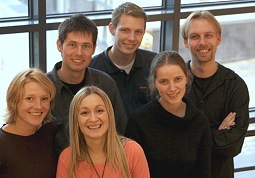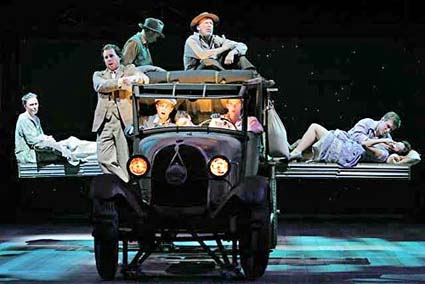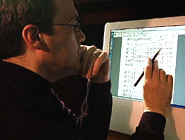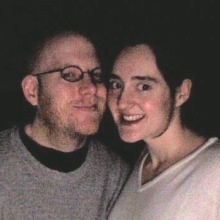 Let’s go to the old mailbag and see what’s happening in the exciting world of new music. Ah, here’s something. Our friends at the American Music Center are launching Counterstream Radio, a showcase for new music by U.S. composers, on March 16 at 3 p.m. EST. To mark the official station launch, Counterstream Radio will broadcast an exclusive conversation between Meredith Monk and Björk. No word on who gets to wear the chicken suit.
Let’s go to the old mailbag and see what’s happening in the exciting world of new music. Ah, here’s something. Our friends at the American Music Center are launching Counterstream Radio, a showcase for new music by U.S. composers, on March 16 at 3 p.m. EST. To mark the official station launch, Counterstream Radio will broadcast an exclusive conversation between Meredith Monk and Björk. No word on who gets to wear the chicken suit.
Actually, the station is streaming right now so you don’t have to wait until the 16th to try it out. Any chance of getting a popup player over here so people can listen while they’re reading S21? Tech people?
Oh, wow. On Bach’s 322nd birthday, March 21, 2007, C.F. Peters is celebrating the publication of a new set of variations, 13 Ways of Looking at the Goldberg, based on the Goldberg Variations theme, with a mini-concert and reception at Steinway Hall. Blair McMillan will perform six of the twelve variations. The composers are C. Curtis-Smith, Jennifer Higdon, Mischa Sarche Zupko, Stanley Walden, Bright Sheng, Derek Bermel, David Del Tredici, Fred Lerdahl, William Bolcom, Lukas Foss, Ralf Gothoni, and Fred Hersch.
And then there’s this. The NY Times web site is running a group blog in March called “The Score” that will include writings by Glenn Branca, Alvin Curran, Michael Gordon and Annie Gosfield. They will also run audio excerpts from an exclusive interview with Steve Reich conducted in February.
In a March 5 piece, Michael Gordon attempts to answer the eternal question faced by all contemporary composers: What Kind of Music is That Anyway? (My favorite answer–“Post-Ugly”–is attributed to his co-conspirator David Lang.)
Alas, the feature is on TimesSelect, which is a pay service that costs about $8 a month but they have a free two-week trial offer if you want to check it out. Or, Michael sent me an e-mail copy…nudge, nudge, wink, wink.
 Claus is another composer I ran into on Myspace, and we’ve been corresponding for a few months now. Gahrn began his musical studies as a classical guitarist; from 2001 he studied composition and electroacoustic music at the Academy of Music in Esbjerg, Denmark, earning his MA degree with distinction in 2006. That’s Claus on the right in the photo, with his own young ensemble (including his pianist wife Malwina). There are links above that will take you both to Claus’ personal site, as well as that of the ensemble itself. Under “Media” at either, you’ll find excellent MP3 recordings and performances of Gahrn’s often-introspective yet just-as-often-edgy work.
Claus is another composer I ran into on Myspace, and we’ve been corresponding for a few months now. Gahrn began his musical studies as a classical guitarist; from 2001 he studied composition and electroacoustic music at the Academy of Music in Esbjerg, Denmark, earning his MA degree with distinction in 2006. That’s Claus on the right in the photo, with his own young ensemble (including his pianist wife Malwina). There are links above that will take you both to Claus’ personal site, as well as that of the ensemble itself. Under “Media” at either, you’ll find excellent MP3 recordings and performances of Gahrn’s often-introspective yet just-as-often-edgy work. Out my (Seattle) way, local composer and Seattle Weekly columnist Gavin Borchert this week offered up something titled “
Out my (Seattle) way, local composer and Seattle Weekly columnist Gavin Borchert this week offered up something titled “ Here’s a programming note to remember.
Here’s a programming note to remember.  Since it’s opera week here at Sequenza 21 and there’s a lot of chatter in the comments about transplanting operas between cultures and Galen has raised the topic of fugues in the invisible YouTube video below, it seems somehow fitting to mention that
Since it’s opera week here at Sequenza 21 and there’s a lot of chatter in the comments about transplanting operas between cultures and Galen has raised the topic of fugues in the invisible YouTube video below, it seems somehow fitting to mention that  Speaking of great American operas, Tobias Picker has written two of them; Emmeline, which is an unqualified masterpiece, and An American Tragedy, which I think history will regard more dearly than its contemporary reviews might suggest. Between those two landmarks, Picker wrote a kind of “forgotten” opera called Thérèse Raquin, an epic based on the Zola novel which, like Tragedy, involves an unwanted lover being chucked overboard in favor of a more attractive alternative. Picker’s psychiatrist, if he has one, could probably make something of that.
Speaking of great American operas, Tobias Picker has written two of them; Emmeline, which is an unqualified masterpiece, and An American Tragedy, which I think history will regard more dearly than its contemporary reviews might suggest. Between those two landmarks, Picker wrote a kind of “forgotten” opera called Thérèse Raquin, an epic based on the Zola novel which, like Tragedy, involves an unwanted lover being chucked overboard in favor of a more attractive alternative. Picker’s psychiatrist, if he has one, could probably make something of that.
 It’s a monster week for our gaucho amigo
It’s a monster week for our gaucho amigo  Mike over at
Mike over at